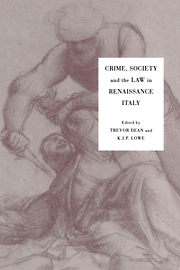Book contents
- Frontmatter
- Contents
- Illustrations
- List of contributors
- Preface
- 1 Writing the history of crime in the Italian Renaissance
- 2 Criminal justice in mid-fifteenth-century Bologna
- 3 The judicial system in Florence in the fourteenth and fifteenth centuries
- 4 The incidence of crime in Sicily in the mid fifteenth century: the evidence from composition records
- 5 Theology, nature and the law: sexual sin and sexual crime in Italy from the fourteenth to the seventeenth century
- 6 Practical problems in the enforcement of Italian sumptuary law, 1200–1500
- 7 The prince, the judges and the law: Cosimo I and sexual violence, 1558
- 8 Intervention by church and state in marriage disputes in sixteenth- and seventeenth-century Florence
- 9 The writer and the man. Real crimes and mitigating circumstances: il caso Cellini
- 10 The political crime of conspiracy in fifteenth- and sixteenth-century Rome
- 11 Fighting or flyting? Verbal duelling in mid-sixteenth-century Italy
- 12 Banditry and lawlessness on the Venetian Terraferma in the later Cinquecento
- 13 Mihi vindictam: aristocratic clans and rural communities in a feud in Friuli in the late fifteenth and early sixteenth centuries
- Index
2 - Criminal justice in mid-fifteenth-century Bologna
Published online by Cambridge University Press: 14 October 2009
- Frontmatter
- Contents
- Illustrations
- List of contributors
- Preface
- 1 Writing the history of crime in the Italian Renaissance
- 2 Criminal justice in mid-fifteenth-century Bologna
- 3 The judicial system in Florence in the fourteenth and fifteenth centuries
- 4 The incidence of crime in Sicily in the mid fifteenth century: the evidence from composition records
- 5 Theology, nature and the law: sexual sin and sexual crime in Italy from the fourteenth to the seventeenth century
- 6 Practical problems in the enforcement of Italian sumptuary law, 1200–1500
- 7 The prince, the judges and the law: Cosimo I and sexual violence, 1558
- 8 Intervention by church and state in marriage disputes in sixteenth- and seventeenth-century Florence
- 9 The writer and the man. Real crimes and mitigating circumstances: il caso Cellini
- 10 The political crime of conspiracy in fifteenth- and sixteenth-century Rome
- 11 Fighting or flyting? Verbal duelling in mid-sixteenth-century Italy
- 12 Banditry and lawlessness on the Venetian Terraferma in the later Cinquecento
- 13 Mihi vindictam: aristocratic clans and rural communities in a feud in Friuli in the late fifteenth and early sixteenth centuries
- Index
Summary
The middle decades of the fifteenth century, leading to the signoria of Giovanni II Bentivoglio, were a period of great political complexity in the history of Bologna. External powers – the duke of Milan and the papacy – contended for control of the city, and factions within it splintered and regrouped as events unfolded. Until 1450, the main thread in that history was the rivalry between the Bentivoglio and the Canetoli, and their factions and friends; after 1450 there evolved first a Bentivoglio-led oligarchy, then a more consolidated Bentivoglio primacy within the city. It was not until the pope decided in the 1460s to endorse the Bentivoglio that the city achieved a point of political stability. These frequent changes of regime and the progress of oligarchy, together with the abundant documentation, make Bologna in this period an interesting contrast both to other republics, such as Florence, and to more fully formed signorie such as Milan, Mantua or Ferrara.
For much of this period, the structure of government, despite frequent modification, remained largely unaltered in its broad outlines. Power was shared between the communal government and the papal legate, as laid down in successive treaties (capitoli) between the city and the popes (1429, 1431, 1447, 1466). The papal claim to appoint the governor, podestà and other officials was usually tempered in various ways (through indirect election, appointment from a prepared short-list, etc.).
- Type
- Chapter
- Information
- Crime, Society and the Law in Renaissance Italy , pp. 16 - 39Publisher: Cambridge University PressPrint publication year: 1994
- 2
- Cited by



